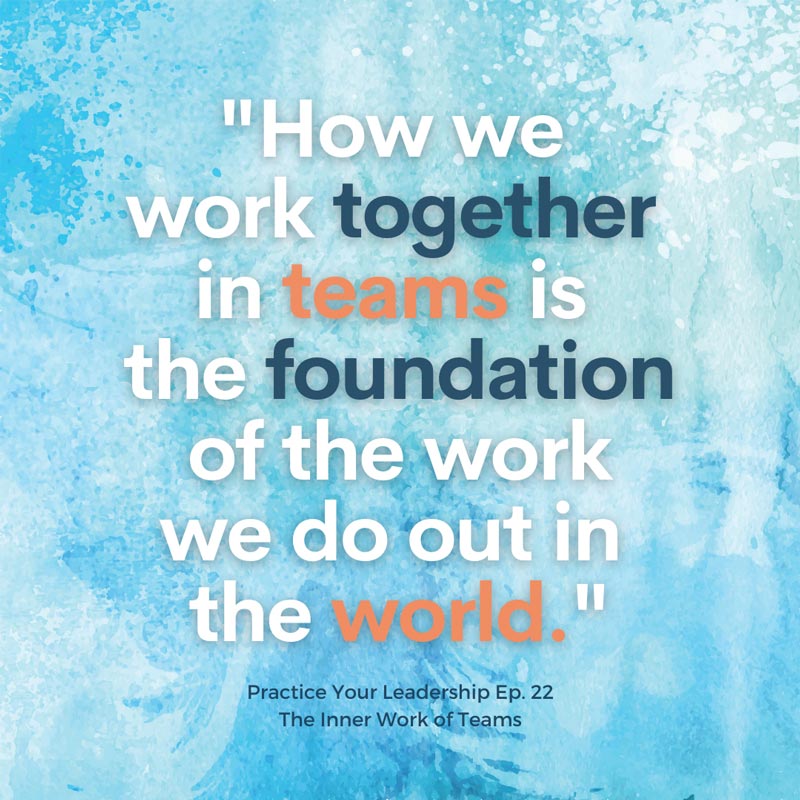Hi everyone, I’m Saralyn Hodgkin. And this is the podcast to practice your leadership.
How we work together in teams is the foundation, the foundation of the work we do out in the world. If we’re not aligned, if we don’t have our stuff together, right, in how we are relationally, the alignment of our intentional behaviors and our actual behaviors, if that’s not lined up, then there’s squawking at the watercooler. There’s like a day’s worth of time a week, I forget what the stats are, but like so much time just managing gossip mills, or hurt feelings or misunderstandings, whatever it might be.
And there is such significant cost to ignoring or not intentionally putting resources, attention, and effort into how we work together as a team. Lots of stats out there on that. My angle here is that it’s a requirement, like forget the costs, you need a business case, go figure out the cost, sure. But in order for us, as teams, teams that are constructed in a way to achieve some form of impact out in the world, whatever that is, the raison d’etre, the purpose for that, why that team is formed, because we’re not forming teams just because it’s fun, right? We’re forming teams in order to get some stuff done. Because we can’t just do it ourselves. We’ve got to do it together. And so the foundation of the work out in the world that these individuals are trying to do, the foundation is how are we working together as a team.
In preparing my ideas for what I wanted to say today, I thought what’s the number one thing that I want to tell people in teamwork, team dynamics, team leadership, whatever jargon you want to put on it, but in working together to try and generate the impact in the world that we’re formed for? What’s the number one thing that I’d want you to know. And the number one thing continues to be the number one thing for me, which is do your own work. As teams, you need to do your own work as a team. So what does that mean?
Number one, if you are not aligning on your behavior, if you’re not intentionally, if you’re reflecting on the behavior of how we act and behave as a team, and that is not aligned with the intentions of, oh, this is how we want to behave together. If you don’t take time to go and look at, but how is that actually happening? What kind of effect is that actually having that can have such significant impact in how you work together? Or how you’re seeing team members leave your team, right? Or how the energy just drains or the lack of innovative thinking and chatting that’s happening in this meeting, it’s just not there. Because people are too scared to speak up. Because the way that we’re behaving is not aligned with the intentions of what we’ve said. Go look at your core values, look at your mission statement, look at the ethos of the work that you provide into the world, whatever touchstones you require. Are you using intentionality to look at your behaviors?
Number two, relationships. Relationships matter. And while the team gets really focused on the widget that you’re trying to produce, the work you’re trying to do. The work is also holding the team in its relationship with individuals. This is the holonic interdependent perspective, that these individuals come to the table not just to push this paper, do this work, deliver this workshop, but they are holes in and of themselves that become interdependent and create the system that we then call team, and in that team relationships matter. Tending to those relationships matter. It doesn’t just happen on its own.
Number three, do your own work so that you can align towards your impact. Do your own work on the team so that you can create the conditions to align towards the impact you were formed for. Some of this work I’d call the inner work of teams, right? Setting and reflecting on our intentional behaviors, centering that relationships matter, and aligning towards impact that were formed for. The inner work of teams is required to be able to focus on these things by having three different requirements to do that, right?
You need to have resources and rules versus doing this work at the side of your desk, you need to create rhythms and processes versus once a year retreats or one off sessions, right? Rhythms and processes. And then people have to do their own self work, their own self leadership, versus, you know, misplaced expectations on their employers and stuff. So then, of course, the question is, well, what is that inner work of teams? What does it mean for us to do our own work? What are the angles on that? What are the lenses on that?
Well, if you’re trying to do your own work to ensure that you are as a team operationalizing the intentional behaviors that you’ve set, centering relationships because they matter, and aligning ourselves towards impact, there’s significant work you can do here and some of what, some of the following podcasts will do is talk about that. But as a flash fry on what are those things: cultivating psychological safety that leads to bravery, operationalizing that trust that is so foundational to relationships, acknowledging and working on dysfunctions because they exist in every team, crafting common language, and working structures, and simply journeying together.
The inner work of teams all. Do your own work, do it intentionally.
Thanks all, I’m Saralyn. You can find me at holonleadership.org. I walk alongside you as you practice your leadership.



 Apple Podcasts
Apple Podcasts Spotify
Spotify Google Podcasts
Google Podcasts